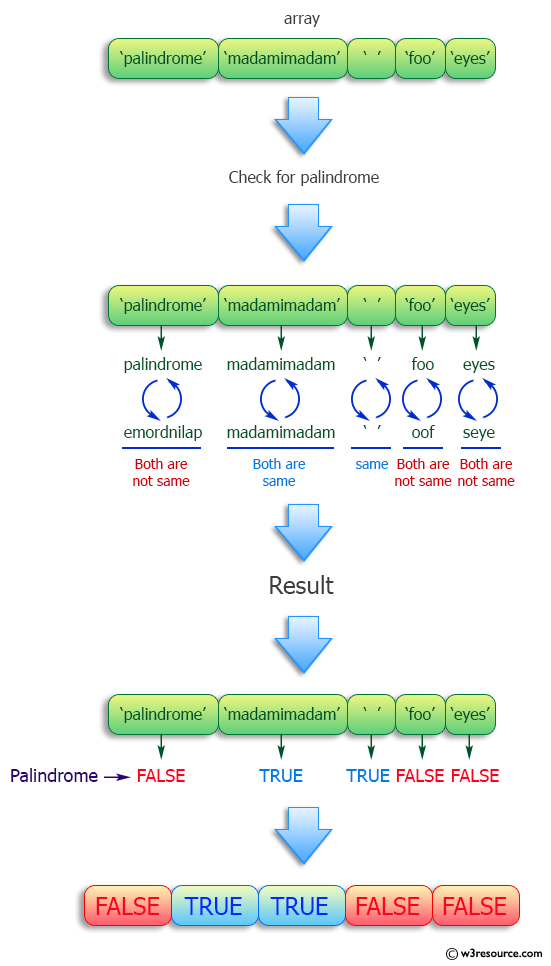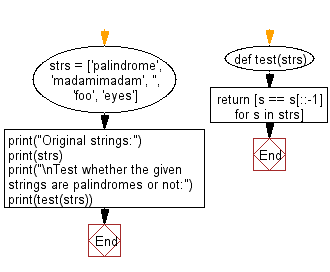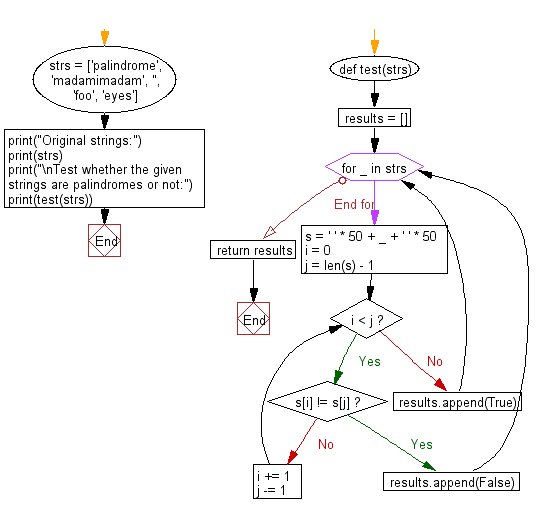Python: Test whether the given strings are palindromes
Python Programming Puzzles: Exercise-12 with Solution
Write a Python program to check whether the given strings are palindromes or not. Return True, False.
Input: ['palindrome', 'madamimadam', '', 'foo', 'eyes'] Output: [False, True, True, False, False]
Pictorial Presentation:

Sample Solution-1:
Python Code:
#License: https://bit.ly/3oLErEI
def test(strs):
return [s == s[::-1] for s in strs]
strs = ['palindrome', 'madamimadam', '', 'foo', 'eyes']
print("Original strings:")
print(strs)
print("\nTest whether the given strings are palindromes or not:")
print(test(strs))
Sample Output:
Original strings: ['palindrome', 'madamimadam', '', 'foo', 'eyes'] Test whether the given strings are palindromes or not: [False, True, True, False, False]
Flowchart:

Visualize Python code execution:
The following tool visualize what the computer is doing step-by-step as it executes the said program:
Sample Solution-2:
Python Code:
def test(strs):
results = []
for _ in strs:
# padding each string with spaces on both sides
# by default, the pad_to parameter is 50
s = ' ' * 50 + _ + ' ' * 50
i = 0
j = len(s) - 1
while i < j:
if s[i] != s[j]:
results.append(False)
break
else:
i += 1
j -= 1
else:
results.append(True)
return results
strs = ['palindrome', 'madamimadam', '', 'foo', 'eyes']
print("Original strings:")
print(strs)
print("\nTest whether the given strings are palindromes or not:")
print(test(strs))
Sample Output:
Original strings: ['palindrome', 'madamimadam', '', 'foo', 'eyes'] Test whether the given strings are palindromes or not: [False, True, True, False, False]
Flowchart:

Visualize Python code execution:
The following tool visualize what the computer is doing step-by-step as it executes the said program:
Python Code Editor :
Have another way to solve this solution? Contribute your code (and comments) through Disqus.
Previous: Find the indexes of numbers, below a given threshold.
Next: Find the strings in a list, starting with a given prefix.
What is the difficulty level of this exercise?
Test your Programming skills with w3resource's quiz.
Python: Tips of the Day
Find current directory and file's directory:
To get the full path to the directory a Python file is contained in, write this in that file:
import os dir_path = os.path.dirname(os.path.realpath(__file__))
(Note that the incantation above won't work if you've already used os.chdir() to change your current working directory, since the value of the __file__ constant is relative to the current working directory and is not changed by an os.chdir() call.)
To get the current working directory use
import os cwd = os.getcwd()
Documentation references for the modules, constants and functions used above:
- The os and os.path modules.
- The __file__ constant
- os.path.realpath(path) (returns "the canonical path of the specified filename, eliminating any symbolic links encountered in the path")
- os.path.dirname(path) (returns "the directory name of pathname path")
- os.getcwd() (returns "a string representing the current working directory")
- os.chdir(path) ("change the current working directory to path")
Ref: https://bit.ly/3fy0R6m
- New Content published on w3resource:
- HTML-CSS Practical: Exercises, Practice, Solution
- Java Regular Expression: Exercises, Practice, Solution
- Scala Programming Exercises, Practice, Solution
- Python Itertools exercises
- Python Numpy exercises
- Python GeoPy Package exercises
- Python Pandas exercises
- Python nltk exercises
- Python BeautifulSoup exercises
- Form Template
- Composer - PHP Package Manager
- PHPUnit - PHP Testing
- Laravel - PHP Framework
- Angular - JavaScript Framework
- Vue - JavaScript Framework
- Jest - JavaScript Testing Framework
